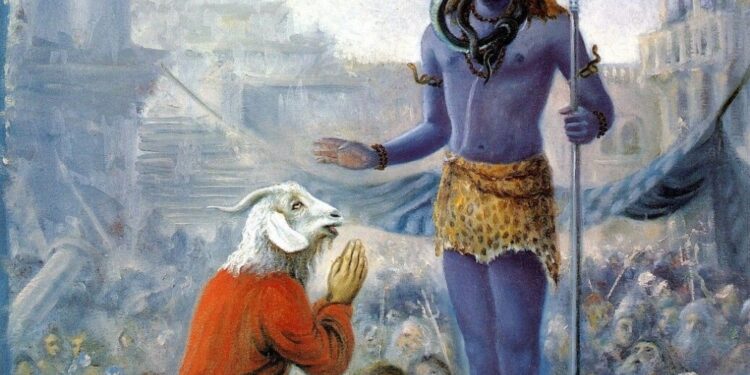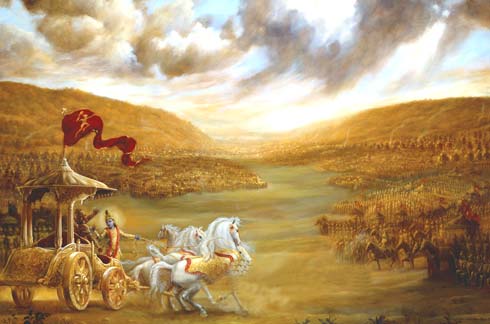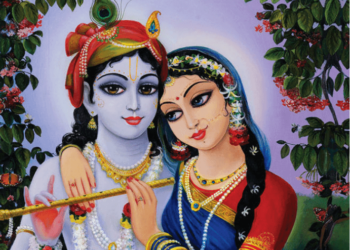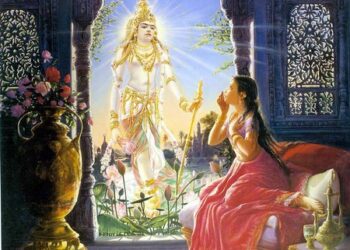Lord Shiva sends Virabhadra to Destroy Daksha’s Sacrifice
In this way, the sacrifice of Daksha was disrupted. The devas and brahmanas silently remained in their places, in a fearful state of mind. Meanwhile, news of what had happened was relayed to Lord Shiva by Narada Muni. In terrible anger, Lord Shiva jumped up from his seat, pulled out some of his matted hair, and dashed it onto the ground. Immediately, a great demon, Virabhadra, rose up from the earth, accompanied by many varieties of fevers in personified forms.
Virabhadra inquired, “My lord, what task is to be accomplished by me?”
Lord Shiva succinctly said, “Go and destroy the sacrifice of Daksha!”
As Virabhadra and his hordes of ghosts and spirits approached, those in the sacrificial arena of Daksha experienced very fearful omens. A strong wind blew carrying dirt and sand. It began to shower blood as all quarters were enveloped in darkness. Thousands of meteors fell upon the earth.
Being frightened, the demigods took shelter of Lord Vishnu and in response, the Lord gave them assurances. At the same time, however, He informed Daksha, “This fearful condition has beset you because of your disregard for Lord Shiva. None of us are powerful enough to counteract this calamity, which was brought about by your wicked behavior. There is no need to say more.”
Upon hearing this, Daksha became pale and sat silently on the ground, absorbed in thought. At this time, Virabhadra arrived upon the scene, accompanied by the nine Durgas (nava-durga). The nine Durgas were Kali, Katyayani, Ishana, Chamunda, Mundamardini, Bhadra-kali, Bhadra, Tvarita, and Vaishnavi. A great horde of ghosts and spirits also entered the sacrificial arena. All of the attendants of Lord Shiva who accompanied Virabhadra had forms resembling that of Mahadeva. They had five heads, blue throats, ten arms, and three eyes. They wore matted hair that bore the emblem of the crescent moon. Virabhadra had three eyes and one thousand arms and he was entwined with many serpents. His chariot was drawn by two thousand horses and one million lions. Defending his two sides were many lions, elephants and sharks.
As music played, the associates of Lord Shiva went in front of Virabhadra, indulging in various kinds of dances. The great sound of their shouts reverberated throughout the three worlds. The devas, Daityas, and Rakshashas who had attended Daksha’s sacrifice, while observing the portents indicating the destruction of the world, stood up simultaneously to watch the approach of Lord Shiva’s hordes—some through the sky and some on the ground.
The demigods, demons, and Rakshashas said, “Let us pick up our weapons and confront them.” Upon seeing how his side was preparing for war and mounting their vehicles, Daksha petitioned Lord Vishnu to give them all protection.
In response, Lord Vishnu told him, “You say that I should protect you and this sacrifice but you seem to forget how you insulted Lord Shiva at Naimisharanya. O wicked one, this was a great fault of yours. Now, I do not see anyone competent to protect you from Rudra’s wrath. The performance of a sacrifice, in and of itself, is not sufficient to award one benefit. One who insults Lord Shiva should never expect to benefit by performing religious rituals.
Those who disrespect Lord Shiva go to hell, even though they may have performed millions of sacrifices. It is not karma (acts) alone that produces good results—it is the good will of the controller of material nature, Lord Shiva, that insures auspiciousness and prosperity.”
Daksha replied, “O slayer of Madhu, it appears that You are discrediting the authority of the Vedas. How can one renounce the Vedas and accept the authority of Shiva?”
Lord Vishnu said, in a conciliatory manner, “The Vedas mainly deal with the three modes of material nature and the lord of material nature is Shiva. Therefore, for success in the performance of sacrifice, one must take shelter of Lord Shiva.”
As they were conversing in this way, the army of demigods arrived on the scene, being desirous of fighting. At the urging of Bhrigu Muni, the demigods, led by Indra, were eager to destroy the army of Lord Shiva, led by Virabhadra. Thereafter, in the fierce battle that took place, the demigods routed the army of Lord Shiva’s associates, being strengthened by the mantras chanted by Bhrigu.
Upon seeing the defeat of his army, Virabhadra became enraged. Advancing to the front ranks, he proceeded to create a slaughter among the ranks of the demigods so that they all fled the battlefield, leaving only Indra and the loka-palas, who were still eager to fight.
Indra went and asked Brihaspati, “How can we attain victory?”
Brihaspati unhesitatingly replied, “What was spoken by Lord Vishnu previously has been proven true today. It is not merely the performance of sacrifice or any other Vedic ritual that awards one auspiciousness and prosperity. It is Lord Shiva who imbued material nature with its characteristics that award one happiness and misery. It is the favor of Mahadeva and not the mere performance of sacrifice that should be sought after.”
“Indra, you and the other directors of universal affairs have taken a foolish course of action in trying to oppose Lord Shiva.”
Upon hearing this, Indra and the other demigods became anxious. Virabhadra said to the demigods, “You have come here for the purpose of attaining avadana (glorious achievement). For your satisfaction, I shall now give you avadanas (cutting into pieces).
After saying this, Virabhadra released an onslaught of arrows that made the demigods panic and flee in all directions. Virabhadra and the associates of Lord Shiva then entered the deserted sacrificial arena. At that time, the sages said to Lord Vishnu, “Please protect Daksha’s sacrifice. After all, You are the yajna-purusha (personification of sacrifice).”


















